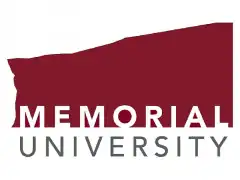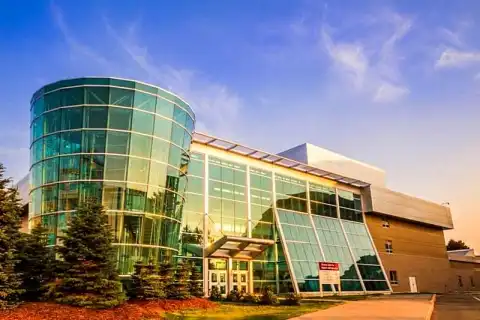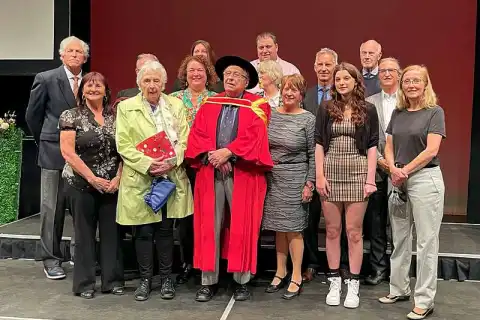Master of Engineering - Computer Engineering
- 2 years
- Duration
- 9,666 CAD
- Price
- Rolling admission
- Start
- Rolling admission
- Deadline
- Master
- Degree
- Campus
- Format
- St. John's / Canada
- Location
Program description
The Faculty of Engineering and Applied Science offers graduate diplomas as well as MASc, MEng, and PhD degrees in civil, communications, computer, electrical, energy systems, mechanical, ocean and naval architecture, oil and gas, process, and safety and risk engineering. Faculty knowledge spans a wide range of disciplines and backgrounds; many faculty members have extensive industrial experience and supplement their teaching and research programmes with consulting services.
The graduate programmes offered by the Faculty of Engineering and Applied Science have expanded dramatically in recent years, both in terms of student strength and course and programme variety. Our faculty members are increasingly involved in important research initiatives funded by NSERC, AIF, CRC, and CFI, giving students rare opportunities to collaborate alongside distinguished project investigators. Graduate students have access to all research facilities and resources, and research funding is divided across fields. The faculty encourages students to construct distinctive and difficult personalised curricula by combining two or more standard subjects.
Program structure
- Computer Software Foundations
- Computer Hardware Foundations
- Advanced Computing Concepts for Engineering
- Software Design and Specification
- Advanced Digital Systems
- Computer Engineering Project
Price
- Tuition — 9,666 CAD
OTHER FEES (REQUIRED) amounts listed are for two semesters
- Student Services Fee — 150 CAD
- Students' Union — 100 CAD
- Recreation Fee — 220 CAD
- Health Insurance — 560 CAD
Requirements for applicants
Bachelor's degree (minimum second class or ‘B’ standing) in an appropriate area of study
To be considered for admission to the program, an applicant will normally possess a relevant second class or better undergraduate degree in the areas of science, technology, engineering or equivalent, both in achievement and depth of study, from an institution recognized by the Senate. Any other applicant may be considered for admission provided that:
- The applicant has completed a second-class or equivalent undergraduate degree from an institution recognized by the Senate;
- The applicant demonstrates a satisfactory level of knowledge of math and science through undergraduate or graduate course.
- The applicant demonstrates in a statement of interest, a commitment and passion for ocean mapping and related technology through combined efforts of prior technical training in a relevant ocean technology field and employment or experience in field schools, research programs, the ocean technology industry, regulatory agencies or government departments, non-governmental organizations, consulting activities, or other relevant activities.
Completion of additional course work in math, science, and/or related technology may be required.
Applicants who did not complete a baccalaureate or post-graduate degree at a recognized university where English is the primary language of instruction must normally complete either the:
- Test of English as a Foreign Language (TOEFL) and achieve a paper-based score of 580 (or higher), computer-based score of 237 (or higher), or internet-based score of 92-93 (or higher); or
- International English Language Testing System (IELTS) and achieve a score of 7 (or higher).
- Information regarding the TOEFL is available from the Educational Testing Services at www.ets.org. IELTS information is available at www.ielts.org. Please note that other equivalent tests acceptable to Memorial University’s School of Graduate Studies will also be considered.
About the university

Memorial University has a unique responsibility to the people of Newfoundland and Labrador as the only university in the province. Memorial University was founded as a tribute to the Newfoundlanders who gave their lives in military duty during globe War I and later conflicts. We take inspiration from their efforts to create a better future for our province, our country, and the globe.
Over 115 different nations are represented among Memorial University's 19000+ students. Programs range from the traditional to the cutting edge, and can be found at any of Memorial's five locations or online. Memorial University's worldwide network of nearly 100,000 successful alums enhances the institution's capacity and reputation for leadership in research, teaching, and public engagement. Learn more about Memorial University in this quick read.
Vision, Mission
- Vision — Memorial University will rise to prominence as one of Canada's and the world's top public institutions of higher learning, and it will honor its commitment to serving the people of Newfoundland and Labrador.
- Mission — When it comes to education, research, scholarship, creative activity, service, and public engagement, Memorial University is committed to being at the forefront of innovation and excellence. International students and scholars are welcomed and supported at Memorial, and the institution's contributions of knowledge and experience are valued on all levels of society.
Campuses
More than 19,400 students and 3,800 teachers and staff from more than 115 countries study, teach, conduct research, create, and participate in activities at our campuses and other locations. You can attend classes at one of Memorial University's several campuses in Newfoundland and Labrador or anywhere in the world; we also offer 475 courses online.
- St. John's campus
- Grenfell Campus
- Marine Institute
- Harlow Campus
- Signal Hill Campus
- Labrador Campus
Read more about Memorial University, Newfoundland and Labrador, Canada





